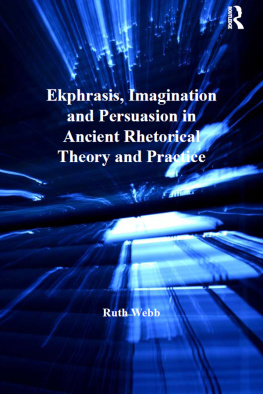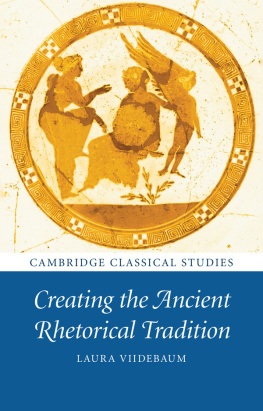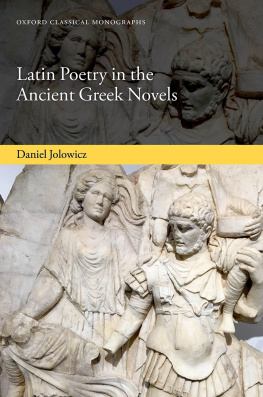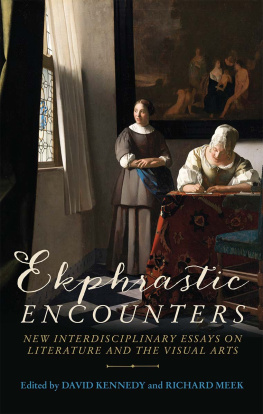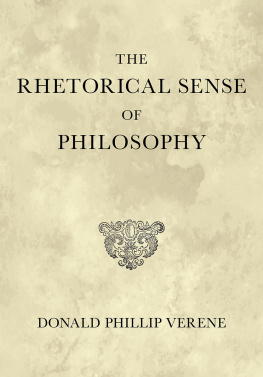EKPHRASIS, IMAGINATION AND PERSUASION IN ANCIENT RHETORICAL THEORY AND PRACTICE
EKPHRASIS, IMAGINATION AND PERSUASION IN ANCIENT RHETORICAL THEORY AND PRACTICE
Ruth Webb

First published 2009 by Ashgate Publishing
Published 2016 by Routledge
2 Park Square, Milton Park, Abingdon, Oxon OX14 4RN
711 Third Avenue, New York, NY 10017, USA
Routledge is an imprint of the Taylor & Francis Group, an informa business
Copyright Ruth Webb 2009
Ruth Webb has asserted her moral right under the Copyright, Designs and Patents Act, 1988, to be identified as the author of this work.
All rights reserved. No part of this book may be reprinted or reproduced or utilised in any form or by any electronic, mechanical, or other means, now known or hereafter invented, including photocopying and recording, or in any information storage or retrieval system, without permission in writing from the publishers.
Notices:
Product or corporate names may be trademarks or registered trademarks, and are used only for identification and explanation without intent to infringe.
British Library Cataloguing in Publication Data
Webb, Ruth, 1963
Ekphrasis, imagination and persuasion in ancient rhetorical theory and practice
1. Ekphrasis 2. Rhetoric, Ancient
I. Title
809.93357
Library of Congress Cataloging-in-Publication Data
Webb, Ruth, 1963
Ekphrasis, imagination and persuasion in ancient rhetorical theory and practice / Ruth
Webb.
p. cm.
Includes bibliographical references.
ISBN 978-0-7546-6125-2 (alk. paper)
1. Ekphrasis. 2. Rhetoric, Ancient. I. Title.
PN56.E45W43 2009
808.0481dc22
2008035799
ISBN 9780754661252 (hbk)
Contents
List of Tables
Abbreviations
AJP | American Journal of Philology |
BAGB | Bulletin de lAssociation Guillaume Bud |
BASP | Bulletin of the American Society of Papyrologists |
BICS | Bulletin of the Institute of Classical Studies |
BMGS | Byzantine and Modern Greek Studies |
CP | Classical Philology |
CQ | Classical Quarterly |
DOP | Dumbarton Oaks Papers |
GRBS | Greek, Roman and Byzantine Studies |
HSCP | Harvard Studies in Classical Philology |
JRS | Journal of Roman Studies |
JWCI | Journal of the Warburg and Courtauld Institutes |
MD | Materiali e discussioni per lanalisi dei testi classici |
Or. | Oration |
PCPS | Proceedings of the Cambridge Philological Society |
REG | Revue des tudes grecques |
RhMus | Rheinisches Museum fr Philologie |
TAPA | Transactions of the American Philological Association |
Walz, Rhetores graeci | Rhetores graeci, ed. Christian Walz (9 vols, Stuttgart: Sumptibus J.G. Cottae, 183236) |
ZPE | Zeitschrift fr Papyrologie und Epigraphik |
Acknowledgements
The length of time over which this project has been evolving means that I owe a huge debt to a great many people, from my original supervisors at the Warburg Institute, Jill Kraye and Liz McGrath, and Jean-Michel Massing who first mentioned Philostratos to me, to colleagues at Kings College London, Princeton and the Universit Paris X Nanterre. The following people have made particular contributions through invitations to contribute to conferences or to joint publications, by reading various drafts or simply by being willing to discuss various aspects of the subject. They are, in alphabetical order, Michael Baxandall, Susanna Braund, Averil Cameron, Alejandro Coroleu, Sandrine Dubel, Ja Elsner, Christopher Gill, Franoise Graziani, Liz James, Bob Kaster, Mario Klarer, Margaret Mullett, Laurent Pernot, Stphane Rolet, Charlotte Rouech, Agns Rouveret, Suzanne Sad, John Smedley, Oliver Taplin, Philip Weller, Barbara Zeitler and Froma Zeitlin.
Preface
My work on ekphrasis in the Greek rhetorical tradition began with the research for my Ph.D. thesis, The Transmission of the Eikones of Philostratos and the Development of Ekphrasis from Late Antiquity to the Renaissance (Warburg Institute, London, 1992). The thesis itself contained a brief overview of the ancient theories of ekphrasis and enargeia as found in the Progymnasmata and other rhetorical treatises and has provided the core of the present book. The material on the subject contained in the thesis has been greatly expanded: the treatment is in greater depth and more sources are discussed. The plan of this book has undergone several permutations over the years. In the end, I have opted for a smaller chronological range (first to fifth centuries CE) and to restrict the study mostly to the rhetorical handbooks. Regrettably, this has reduced the space available for the discussion of Christian texts and of the later, Byzantine, material. There is also less analysis of examples of ekphrasis than I had at first planned. However, the elucidation of the main sources for the theory of ekphrasis and enargeia, many of which are neither well known nor easily approachable, seemed to me to be the priority. I hope to be able to fill some of the lacunae I have identified at some point in the future.
A word about the transliteration of the Greek: I have tried to reproduce as far as possible the Greek spellings (-os rather than -us, ai rather than ae or e, k rather than c) but have kept the more familiar forms of well-known names, such as Thucydides and Achilles. The result, as usual, is not perfect.
Ruth Webb
Introduction
A speech that brings the subject matter vividly before the eyes
This is the definition of ekphrasis taught to students in the Greek schools of the Roman Empire as they began their studies of rhetoric. It is a very different definition from the one which has become familiar in modern literary criticism for, however ekphrasis is defined in modern critical discourse, it is usually seen as a text or textual fragment that engages with the visual arts. Over the last few decades, ekphrasis has been defined as the poetic description of a pictorial or sculptural work of art, the verbal representation of visual representation or words about an image. For all their variety, these definitions place a central importance on a certain type of referent: the visual arts (a category which sometimes includes and sometimes excludes buildings and monuments). But this was not its ancient sense.
This book is an exploration of the range of meaning of the term as it was used in antiquity. It is a positive attempt to understand and explain a set of ideas about language and its impact on the listener that are expressed in the rhetorical handbooks of the first centuries CE, when Greek rhetoric reached a height of sophistication under the Roman Empire. Ideally it ought to be possible to start straight away with this analysis, but the popularity of the modern definition of the term makes it necessary to include some preliminary remarks about what is and what is not included in this book and why.
Next page
